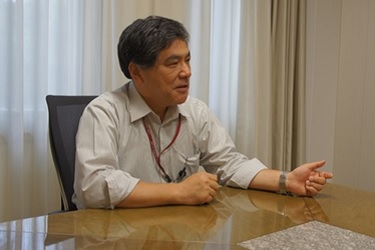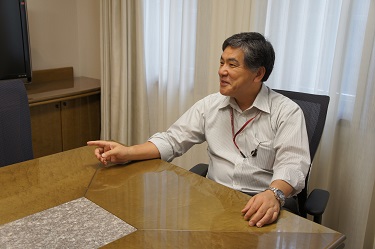Areas managed: administrative organizations, legal affairs, personnel management, public relations

Hayashi Towatari
Graduated from Kyoto University's Faculty of Law. Joined the Ministry of Education, Science and Culture (currently the Ministry of Education, Culture, Sports, Science and Technology (MEXT)) in 1981 and became a deputy director-general of MEXT in 2010. Appointed as an executive director of the Japan Society for the Promotion of Science in 2012. Area of specialty: educational administration
Graduated from Kyoto University's Faculty of Law. Joined the Ministry of Education, Science and Culture (currently the Ministry of Education, Culture, Sports, Science and Technology (MEXT)) in 1981 and became a deputy director-general of MEXT in 2010. Appointed as an executive director of the Japan Society for the Promotion of Science in 2012. Area of specialty: educational administration
I am Hayashi Towatari. I was appointed as an executive vice president and I am a member of the new management board under the newly-elected President Gonokami. My responsibilities include supervision of administrative organizations, legal affairs, personnel management and public relations, as well as the management of issues related to diversity and information security.
Facing the rapid progress of globalization, Japan has been required to change its social systems. Accordingly, circumstances surrounding the University have changed dramatically. For example, from the third iteration of mid-term plans and goals that will start from AY2016, the Japanese government will greatly shift its policy on management expenses grants; the government will prioritize distribution of grants in accordance with the direction of functional enhancement. Also, universities will be required to make further efforts to financially support themselves, for example by diversifying revenue, as well as to acquire good management capacity. The reality the University faces is thus becoming increasingly more severe.
Under these circumstances, I would like to promptly implement a variety of initiatives to fulfill the mission of the University that President Gonokami describes in his Policy Declaration as follows: "we will continue to take the lead in collaborative efforts driven by diversity through global viewpoints while discovering trailblazing ways to utilize the new knowledge we create. Moreover, we will continue to answer the perpetual challenge of contributing to human society by educating talented people who will be able to succeed in a global environment."
Facing the rapid progress of globalization, Japan has been required to change its social systems. Accordingly, circumstances surrounding the University have changed dramatically. For example, from the third iteration of mid-term plans and goals that will start from AY2016, the Japanese government will greatly shift its policy on management expenses grants; the government will prioritize distribution of grants in accordance with the direction of functional enhancement. Also, universities will be required to make further efforts to financially support themselves, for example by diversifying revenue, as well as to acquire good management capacity. The reality the University faces is thus becoming increasingly more severe.
Under these circumstances, I would like to promptly implement a variety of initiatives to fulfill the mission of the University that President Gonokami describes in his Policy Declaration as follows: "we will continue to take the lead in collaborative efforts driven by diversity through global viewpoints while discovering trailblazing ways to utilize the new knowledge we create. Moreover, we will continue to answer the perpetual challenge of contributing to human society by educating talented people who will be able to succeed in a global environment."

More specifically, I would like to clarify the responsibilities and jurisdictions of each department of the Administration Bureau and the equivalent offices in each Faculty, Graduate School and Institute. At the same time, I will make efforts to enhance the functions of supporting University operations by establishing administrative organization systems that work quickly and efficiently through the further promotion of information sharing and close cooperation among departments of the Administration Bureau and between the Administration Bureau and Faculties, Graduate Schools and Institutes.
Also, from the viewpoint of diversity, I would like to achieve the following three goals: 1. Continuously implement a variety of projects to swiftly increase the ratio of female students to over 20%. 2. While securing both stability and mobility for staff, revamp personnel and payroll systems to attract outstanding young, female, or foreign academic staff. 3. Fortify functions that support career development, for example by training administrative staff to become professionals who can support knowledge collaboration in close cooperation with academic staff. Furthermore, I would like to advance proactive public relations initiatives to enhance the recognition of the University of Tokyo by communicating the University's various activities and its forward-looking vision to a wider audience in the international community.
I became an executive vice president of the University of Tokyo at an important time in history—70 years have passed since the end of World War II, and we now have to form a foundation for the next 70 years. While there are a lot of issues that we have to face and I feel the heaviness of my responsibilities, I will perform to the best of my duties. I would like to ask for your further support and cooperation.
* (The original Japanese version of this text was contributed by Mr. Towatari.)
** This text is a translation of an article originally printed in Tansei 31 (Japanese language only).
Also, from the viewpoint of diversity, I would like to achieve the following three goals: 1. Continuously implement a variety of projects to swiftly increase the ratio of female students to over 20%. 2. While securing both stability and mobility for staff, revamp personnel and payroll systems to attract outstanding young, female, or foreign academic staff. 3. Fortify functions that support career development, for example by training administrative staff to become professionals who can support knowledge collaboration in close cooperation with academic staff. Furthermore, I would like to advance proactive public relations initiatives to enhance the recognition of the University of Tokyo by communicating the University's various activities and its forward-looking vision to a wider audience in the international community.
I became an executive vice president of the University of Tokyo at an important time in history—70 years have passed since the end of World War II, and we now have to form a foundation for the next 70 years. While there are a lot of issues that we have to face and I feel the heaviness of my responsibilities, I will perform to the best of my duties. I would like to ask for your further support and cooperation.
* (The original Japanese version of this text was contributed by Mr. Towatari.)
** This text is a translation of an article originally printed in Tansei 31 (Japanese language only).






